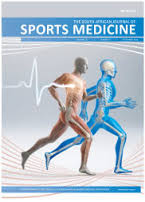The role of selected pre-match covariates on the outcome of One-day International (ODI) cricket matches
DOI:
https://doi.org/10.17159/2078-516X/2023/v35i1a15012Abstract
Background: The identification of key factors that systematically influence a team’s success is important and has led to the application of statistical models in sport. Predicting the outcome of a One Day International (ODI) cricket match, using only pre-match covariates, has been minimally investigated.
Objectives: This research sought to investigate the impact that venue, toss outcome, toss decision, and match type have on the chances of winning an ODI match.
Methods: A total of 1228 men’s international ODI matches were analysed. A logistic regression model was used to identify the significance of these pre-match covariates on the result of the matches.
Results: The results varied across all teams, suggesting that there are individualised factors driving these differences and that generalising the impact pre-match covariates have in every team is unrealistic. New Zealand and India displayed a significant home advantage effect, whereas Australia had a strong tendency towards a significant disadvantage when they won the toss. However, for most teams, toss outcome, toss decision, and match type did not significantly impact the outcome of an ODI match.
Conclusion: New Zealand and Australia were the most predictable teams, whereas South Africa and Pakistan were regarded as unpredictable when pre-match covariates were used to forecast the outcome of their ODI matches.
Downloads
Downloads
Published
Issue
Section
License
Copyright (c) 2023 South African Journal of Sports Medicine

This work is licensed under a Creative Commons Attribution 4.0 International License.
The South African Journal of Sports Medicine reserves copyright of the material published. The work is licensed under a Creative Commons Attribution 4.0 (CC BY 4.0) International License. Material submitted for publication in the South African Journal of Sports Medicine is accepted provided it has not been published elsewhere. The South African Journal of Sports Medicine does not hold itself responsible for statements made by the authors.
How to Cite
- Abstract 447
- PDF 370





.png)